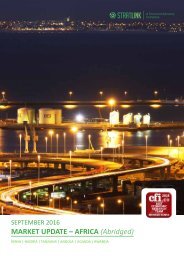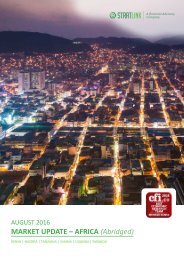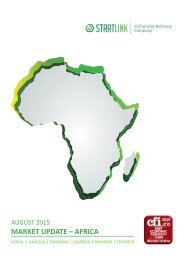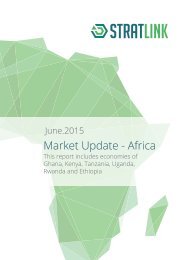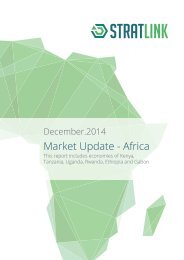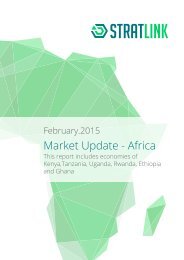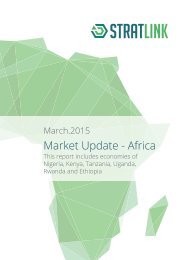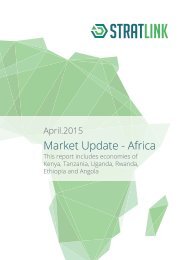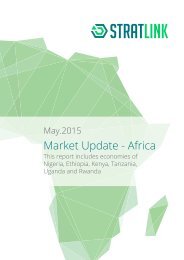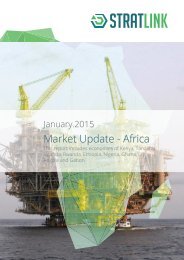Africa Market Update - July 2015
This report includes the economies of Kenya, Gabon, Tanzania, Uganda, Rwanda and Ethiopia
This report includes the economies of Kenya, Gabon, Tanzania, Uganda, Rwanda and Ethiopia
Create successful ePaper yourself
Turn your PDF publications into a flip-book with our unique Google optimized e-Paper software.
MARKET UPDATE – AFRICA | <strong>July</strong> <strong>2015</strong><br />
Whereas the<br />
scale of victory<br />
would be widely<br />
expected to bode<br />
well for EPRDF, it<br />
is bound to evoke<br />
grave concerns<br />
from investors<br />
on the state of<br />
the country’s<br />
democracy.<br />
POLITICAL OUTLOOK<br />
Sweeping Victory for EPRDF in May<br />
<strong>2015</strong> Poll<br />
In line with StratLink <strong>Africa</strong>’s pre-election<br />
issue (May <strong>2015</strong> <strong>Market</strong> <strong>Update</strong> – Is the<br />
Die Cast? [http://www.stratlinkglobal.com/<br />
download/May%20<strong>2015</strong>%20<strong>Africa</strong>%20<strong>Market</strong>%20<strong>Update</strong>.pdf]<br />
the ruling party, Ethiopia<br />
People’s Revolutionary Democratic Front<br />
(EPRDF), clinched landslide victory in the<br />
May poll. EPRDF and allied parties won all<br />
547.0 seats in the parliamentary election<br />
consolidating its foothold on the political<br />
landscape. As the party’s maiden election<br />
post-Meles Zenawi, EPRDF is well placed to<br />
assert its position in the wake of mounting<br />
clamour for broader democratic space and<br />
tolerance of dissent.<br />
What is the State of Ethiopia’s<br />
Democracy?<br />
Whereas the scale of victory would be widely<br />
expected to bode well for EPRDF, it is bound<br />
to evoke grave concerns from investors on<br />
the state of the country’s democracy. Of<br />
note is that in the May <strong>2015</strong> poll, external<br />
observers such as the Carter Center and the<br />
European Union were not invited (unlike in<br />
the 2010 election). Factions of the opposition<br />
have decried that the May <strong>2015</strong> election<br />
failed to provide a level playing field for<br />
a free and fair exercise. As such, the official<br />
election outcome could serve as a catalyst<br />
for growing anti-government sentiment.<br />
Civil Liberties Baggage from the Preelection<br />
Period<br />
Our pre-election issue indicated that aspects<br />
such as voter turnout would be critical<br />
in determining the state of the electorate in<br />
the country. As such, we await the official<br />
publication of the same to pass holistic assessment<br />
of the recent polls. We observe,<br />
however, that EPRDF faces a considerable<br />
task in addressing growing grievance by<br />
sections of the population over constrained<br />
liberties especially through the anti-terrorism<br />
legislation.<br />
ECONOMIC OUTLOOK<br />
Rising Inflationary Pressures<br />
Since April <strong>2015</strong>, StratLink <strong>Africa</strong> has been<br />
cautious about inflation in Ethiopia tabling<br />
a case for likely hawkish monetary policy in<br />
the period to Q3, <strong>2015</strong>. Available data indicates<br />
inflation nudged to a high of 9.4% as at<br />
May <strong>2015</strong> driven principally by food prices.<br />
Despite robust economic growth in the last<br />
decade, the country remains susceptible to<br />
climatic shocks with agriculture accounting<br />
for 46.4% of the Gross Domestic Product.<br />
BUSINESS ENVIRONMENT<br />
Ethiopia-Djibouti Rail Progress Augurs Well for Logistics<br />
Ethiopia Railways Corporation has reported the Sebeta-<br />
Mieso-Djibouti Railway project is 73.0% complete 25 . We<br />
expect this project to play a major role in easing transportation<br />
of cargo from the Port of Djibouti which is reported<br />
to account for over 90.0% of the country’s import-export<br />
trade 26 . Official estimates indicate that traders spend up<br />
to 16.0% of the country’s value of foreign trade on transit<br />
cost per day 27 .<br />
Coming on the Back of Bold Undertakings<br />
We note that fast-tracking of the Ethiopia – Djibouti<br />
Railway project comes on the back of a raft of initiatives<br />
by the government geared towards improving logistics.<br />
In January <strong>2015</strong>, Ethiopia announced it would begin using<br />
the Port of Sudan for imports (hitherto the port had been<br />
used exclusively for exports) in view of growing demand<br />
by the economy. In April <strong>2015</strong>, the country further unveiled<br />
the National Logistics Strategy to be implemented<br />
between <strong>2015</strong> and 2020 28 .<br />
Upgrade and Expansion of Infrastructure<br />
Not only is Ethiopia upgrading its existing links to the Port<br />
of Djibouti but more importantly broadening alternatives.<br />
This is crucial in mitigating risks that could stem, for instance,<br />
from deterioration of inter-state relations between<br />
Ethiopia and Djibouti. This also comes in handy within the<br />
context of a competitive region with Kenya and Tanzania<br />
upgrading the ports of Mombasa and Dar es Salaam,<br />
respectively, in a bid to attract investors.<br />
25 Business Monitor International May <strong>2015</strong><br />
26 The Reporter, January <strong>2015</strong><br />
27 Ministry of State for Finance and Economic Development<br />
28 United Nations Development Program, Government of Ethiopia<br />
18 | StratLink <strong>Africa</strong> Ltd.<br />
www.stratlinkglobal.com




